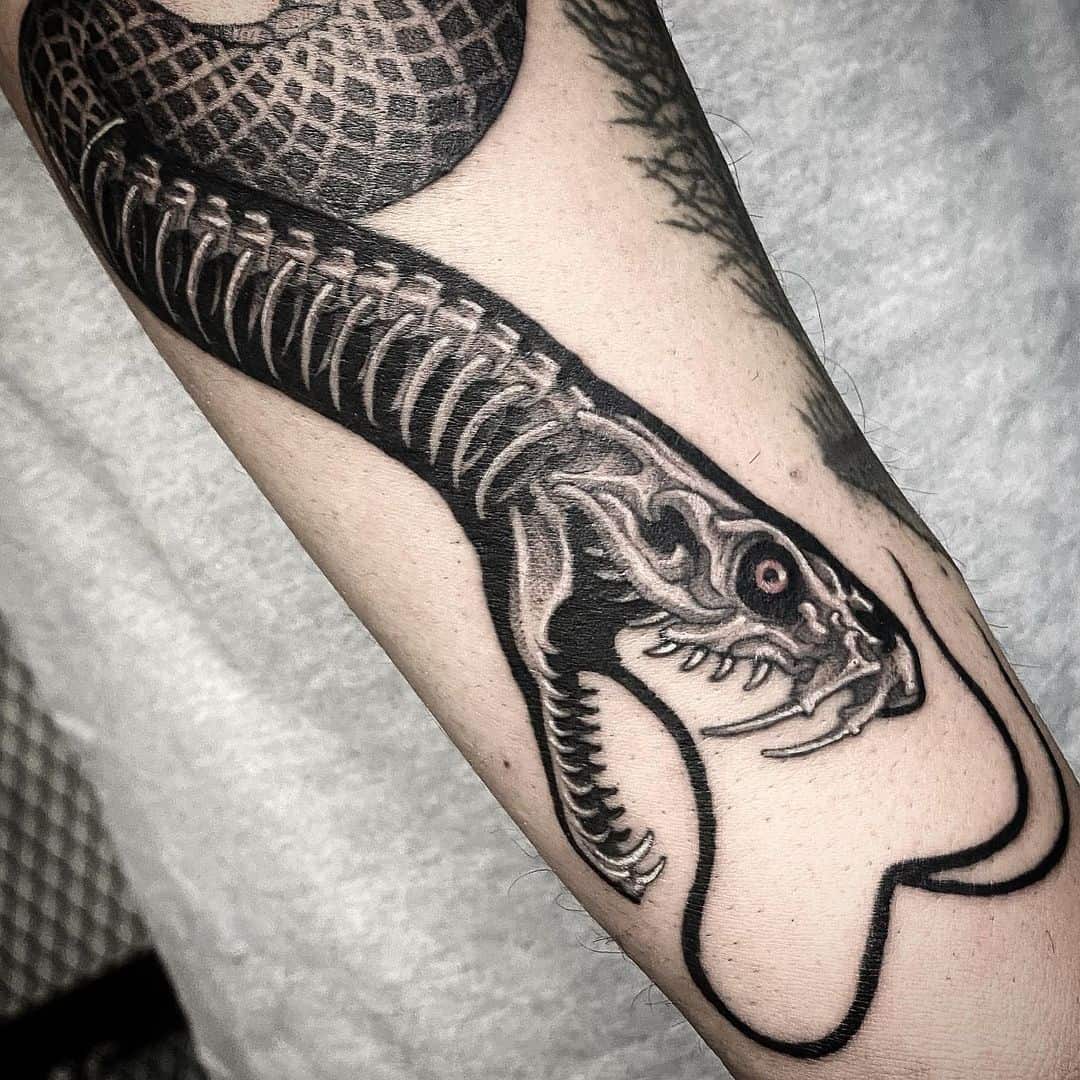Exploring the Symbolism of Skull and Snake Tattoos
The human canvas tells stories, and few images speak as powerfully as the combined symbolism of a skull and snake tattoo. This captivating design, often intertwined with intricate details, holds a depth of meaning that transcends mere aesthetics. What draws individuals to this potent imagery? Let's explore the allure and significance of the skull and snake tattoo.
The skull, a universal symbol of mortality, takes on a variety of interpretations across cultures. It can represent death, transformation, and the ephemeral nature of life. Pairing it with the snake, a creature often associated with rebirth, healing, and knowledge, adds another layer of complexity. Together, these symbols create a powerful narrative that resonates with many.
Historically, both skulls and snakes have held significant meaning in different traditions. Skulls have been used in art and rituals for centuries, symbolizing everything from ancestor worship to memento mori, a reminder of the inevitability of death. Snakes, similarly, have been revered and feared, representing both poison and cure, destruction and creation.
The popularity of skull and snake tattoos likely stems from this rich history and the inherent symbolism of these two powerful images. They offer a way to express a range of personal beliefs and experiences, from overcoming adversity to embracing change. The design’s versatility allows for endless variations, from realistic depictions to stylized interpretations.
One consideration when choosing this tattoo design is its placement. The size and complexity of the design will influence where it can be effectively placed on the body. Some popular locations include the arms, legs, back, and chest. Consulting with a skilled tattoo artist is essential to discuss placement, design, and the overall aesthetic.
The origins of these combined symbols in tattooing can be traced back to various cultural influences, including traditional American and Japanese tattooing. The snake coiled around a skull can represent the cycle of life and death, the continuous process of renewal and transformation. In some interpretations, it symbolizes overcoming mortality or conquering fear.
Three potential benefits of a skull and snake tattoo are personal expression, artistic appreciation, and conversation starters. Personal expression comes from choosing a design that resonates deeply with one's own values and experiences. Artistic appreciation arises from the intricate detail and artistry that a skilled tattoo artist can bring to the design. Finally, the striking imagery often serves as a conversation starter, allowing individuals to share the story and meaning behind their tattoo.
When considering a skull and snake tattoo, creating an action plan can be helpful. First, research different designs and artists. Second, consult with a chosen artist to refine the design and placement. Third, schedule the tattoo appointment. Fourth, follow the artist's aftercare instructions diligently.
Advantages and Disadvantages of Skull and Snake Tattoos
| Advantages | Disadvantages |
|---|---|
| Powerful Symbolism | Potential Negative Interpretations |
| Artistic Expression | Permanence |
| Conversation Starter | Social Stigma in Certain Environments |
Five best practices for getting a skull and snake tattoo include: choosing a reputable and experienced artist, thoroughly researching different designs, discussing placement and size carefully with the artist, following all aftercare instructions meticulously, and being prepared for the commitment of a permanent tattoo.
Frequently Asked Questions:
1. Is a skull and snake tattoo always associated with negative connotations? No, the meaning is often personal and can represent positive transformations.
2. How much does a skull and snake tattoo typically cost? The price varies depending on size, complexity, and the artist's rates.
3. How long does it take to get a skull and snake tattoo? The time depends on the size and intricacy of the design.
4. Is it painful to get a skull and snake tattoo? The level of pain varies depending on individual pain tolerance and the location of the tattoo.
5. Can a skull and snake tattoo be covered up or removed? Cover-ups and removal are possible but can be challenging and expensive.
6. What are some popular variations of the skull and snake tattoo? Variations include different snake species, adding flowers or other elements, and incorporating different styles of skulls.
7. What is the best placement for a skull and snake tattoo? The best placement depends on personal preference and the size of the design.
8. How do I find a reputable tattoo artist? Research online portfolios, read reviews, and ask for recommendations.
Tips and tricks for choosing a skull and snake tattoo design include considering the overall aesthetic, thinking about the symbolism that resonates with you, and looking at various art styles for inspiration.
The skull and snake tattoo, a compelling blend of symbolism and artistry, offers a powerful way to express personal beliefs and experiences. From its rich history to its modern interpretations, this design continues to captivate and intrigue. Whether embracing the cycle of life and death, overcoming adversity, or simply appreciating the aesthetic beauty, the skull and snake tattoo holds a timeless appeal. It's essential to carefully consider the design, placement, and artist to ensure a tattoo that resonates with you for years to come. By understanding the symbolism and taking the time to choose a design that speaks to your individual journey, you can wear this powerful imagery with pride and meaning. Researching reputable artists, understanding aftercare, and committing to the permanence of the tattoo are all crucial steps in this process. Ultimately, a skull and snake tattoo can be a powerful and meaningful addition to your personal narrative.
Arm band tattoos a powerful statement for men
Unlock effortless slalom skiing with the connelly big easy
Decoding the lunar ascent when does the moon rise tonight














